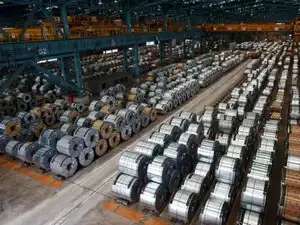Steelmakers, miners at odds over pricing benchmark for ore
, ET Bureau|
Jan 06, 2018, 09.10 AM IST

KOLKATA: India's steel producers and suppliers of iron ore have very different views on the pricing benchmarks to be used for the primary input material for an industry that is crucial for infrastructure-building. Manufacturers want export parity as the peg, while miners prefer setting the tariff in keeping with deemed import costs.
A top official at a local steel major pointed out that logistics costs play a significant role in domestic ore pricing. For instance, there is price difference of between Rs 600 (Chhattisgarh-Karnataka) and Rs 1600 (Odisha -Karnataka), with plants being located far from the mines.
"Given this scenario, the question of import parity is not relevant. Iron ore is one raw material that is locally available and works to our advantage. The pricing of ore should instead be based on export prices," an industry source said.
Export prices are lower than domestic realisation by nearly Rs 500 per tonne after adding export duty and transport costs. Out of the 191.6 MT of iron ore produced in 2016-17, about 24 MT were exported. In 2017-18, exports are slated to touch 30 MT.
An official note on miner NMDC's price increase cited a steep rise in Odisha ore prices in January this year. "While the increase in lump ore prices ranges from Rs 1,200-1300/tonne, for fines it ranges from Rs 550- Rs 700/tonne. Effective price increase by two of the largest Odisha miners who control nearly 40% of the non-captive segment is Rs 1,300 a tonne in lump ore and Rs 700 per tonne in fines," it said.
Imports, however, are hardly a feasible option for Indian plants, given the logistics and transport costs associated with hauling the ore to hinterland locations, an industry source said.
Seshagiri Rao, joint managing director and Group CFO of JSW Steel, the country's largest private steel company, said it imported around 5 MT of iron ore, or a bulk of the 5.7 MT of ore was shipped into India.
JSW, however, relies on imports only where it is feasible at the Dolvi plant in Maharashtra that is located close to India's western water-margin. "We are forced to do so since it is costlier for us to transport ore from Chhattisgarh to Maharashtra than to get it from Brazil," Rao said.
A top official at a local steel major pointed out that logistics costs play a significant role in domestic ore pricing. For instance, there is price difference of between Rs 600 (Chhattisgarh-Karnataka) and Rs 1600 (Odisha -Karnataka), with plants being located far from the mines.
"Given this scenario, the question of import parity is not relevant. Iron ore is one raw material that is locally available and works to our advantage. The pricing of ore should instead be based on export prices," an industry source said.
Export prices are lower than domestic realisation by nearly Rs 500 per tonne after adding export duty and transport costs. Out of the 191.6 MT of iron ore produced in 2016-17, about 24 MT were exported. In 2017-18, exports are slated to touch 30 MT.
An official note on miner NMDC's price increase cited a steep rise in Odisha ore prices in January this year. "While the increase in lump ore prices ranges from Rs 1,200-1300/tonne, for fines it ranges from Rs 550- Rs 700/tonne. Effective price increase by two of the largest Odisha miners who control nearly 40% of the non-captive segment is Rs 1,300 a tonne in lump ore and Rs 700 per tonne in fines," it said.
Imports, however, are hardly a feasible option for Indian plants, given the logistics and transport costs associated with hauling the ore to hinterland locations, an industry source said.
Seshagiri Rao, joint managing director and Group CFO of JSW Steel, the country's largest private steel company, said it imported around 5 MT of iron ore, or a bulk of the 5.7 MT of ore was shipped into India.
JSW, however, relies on imports only where it is feasible at the Dolvi plant in Maharashtra that is located close to India's western water-margin. "We are forced to do so since it is costlier for us to transport ore from Chhattisgarh to Maharashtra than to get it from Brazil," Rao said.
